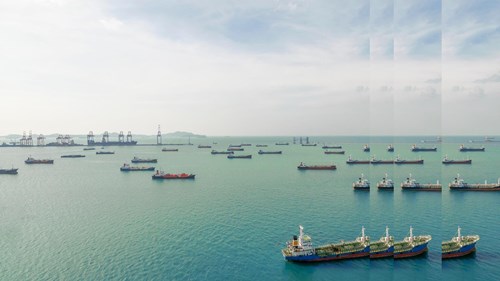Ministerial draft of the Corporate Sanctions Act
On Tuesday, the Federal Ministry of Justice and Consumer Protection published the draft agreed with the other departments of an “Act to Reinforce Integrity in Business”, the heart of which is the “Act on Sanctions for Corporate Crimes” (“Corporate Sanctions Act”). The importance of these revised provisions for criminal law and corporate law cannot be overestimated. In essence, this will introduce corporate criminal law in Germany, even if this is not to be called such, because of the principle of culpability under constitutional law. Eight months ago, a previous version of the ministerial draft, then called the “Act to Combat Corporate Crime”, had become known. We informed you about this at our Compliance Day on 27 September 2019 and in our webinar on 08 October 2019. Compared to this draft, there are some amendments, some of which are only terminological, but some of which are substantial. It is planned that the Act will enter into force two years after its publication in the Federal Gazette. We would like to give you an overview of the proposed provisions below:
I. Scope of application
The Corporate Sanctions Act will apply to legal entities under public and private law, associations without legal capacity and partnerships with legal capacity. However, unlike in the preliminary draft, this applies only if their purpose is to conduct business operations. Federations and unions with no commercial activity and government bodies are not included. However, these may be subject to a corporate fine pursuant to section 30 German Administrative Offences Act (OWiG).
II. Principle of legality
III. Prerequisites for corporate responsibility
The Corporate Sanctions Act requires, firstly, the commission of an offence which breaches the obligations incumbent on the entity or which aims to enrich the entity (known as a corporate crime). The entity is deemed to be the perpetrator of offences committed by:
- a managerial person (governing body, managing director, or authorised signatory in a managerial position, authorised agent or other responsible person)
- a person carrying out the entity’s affairs (employees, but also, where appropriate, external third parties), provided that a managerial person could have prevented or significantly impeded the commission of the offence by means of appropriate arrangements (organisation, selection, instruction or supervision).
The Corporate Sanctions Act is applicable to all entities which are punishable in Germany, even if they were committed abroad. In addition, according to section 2(2) of the draft Corporate Sanctions Act, offences committed abroad but not punishable in Germany are covered if the entity is established in Germany, the offence would be punishable if committed in Germany, and it is also a criminal offence abroad.
IV. Corporate sanctions
1. Sanctions framework
The only sanctions provided for are a corporate sanction and a warning with the right to a sanction reserved (“suspended fine”). The possibility of dissolving the entity, which was still provided for in the previous version, has been abolished.
The sanctions framework is between €1,000 and €10 million for wilful offences and between €500 and €5 million for negligent offences. In the case of entities belonging to a group with an average annual turnover of more than €100 million, the upper limit is 10% or 5% of the average group turnover. The relevant turnover is the average group turnover of the last three financial years prior to the date of the imposition of sanctions, not of the date of commission of the offence. Under section 17 of the draft Corporate Sanctions Act, there is a possibility of further reduction of the sanctions framework in the event of full cooperation and carrying out of internal investigations.
2. Calculation of the sanction
The basis for the actual calculation of the corporate sanction is the importance of the corporate crime, the seriousness and extent of the breaches of supervisory obligations and the economic conditions of the company. In section 15(2) sentence 2 of the draft Corporate Sanctions Act it is explicitly clarified that the group turnover may not be taken into account in the calculation of the company sanction. Section 15(3) of the draft Corporate Sanctions Act contains various perspectives on attribution, in particular the precautions taken before or after the corporate crime to prevent and detect crimes. This allows consideration of the existence or absence or the subsequent implementation of compliance management systems to either increase or reduce the penalty. n.
3. Warning instead of a fine
Instead of imposing a sanction on the company, the court may also issue a warning and reserve the right to impose a corporate sanction. This will apply if, after an overall assessment of all circumstances, the imposition of a corporate sanction is not necessary to induce the company to act in accordance with the law in future. A corporate sanction is only applicable if, despite the warning, the company commits other corporate crimes or breaches conditions and instructions.
It is also possible to combine the two sanction options, namely the imposition of a corporate monetary fine, of which half is ‘suspended’.
4.Conditions and instructions, monitoring
The warning may be subject to conditions, in particular compensation for damage caused by the corporate crime or payment of a sum of money to the Treasury. In that regard, the warning is similar to that provided for in section 153a of the German Code of Criminal Procedure.
In addition, instructions may be imposed on the company to counter the commission of corporate crimes. In particular, instructions for the introduction of arrangements to prevent corporate crimes, such as the introduction or development of compliance processes, may be considered. Compliance with these requirements must be demonstrated by presentation of a certificate of a competent body. However, the possibility of ordering monitoring is not expressly provided for in the Act.
V. Legal succession
With regard to the succession, the draft adopts the provisions introduced by the 9th amendment of the German Act against Restraints of Competition to close the antitrust loophole. This makes it more difficult to evade sanctions through restructuring measures. Sections 6 and 7 of the draft Corporate Sanctions Act are modelled on the antitrust provisions in sections 81, 81a of the German Act against Restraints of Competition. The content of section 6 of the draft Corporate Sanctions Act corresponds to section 30(2a) sentence 1 German Administrative Offence Act on the one hand and section 81(3b) German Act against Restraints of Competition on the other. The provision allows fines to be imposed on the legal successor of the company which is actually to be sanctioned. Section 7(1)(1) of the draft Corporate Sanctions Act corresponds to section 81a of the German Act against Restraints of Competition and permits the sanctioning of the parent company if the termination of the company or the transfer of assets prevents or is likely to prevent the imposition or enforcement of a sanction.
VI. Publication of the corporate sanction
In the case of a large number of damaged parties, the conviction of the entity may be made public; in the case of online publication, for a period of one year (section 14 of the draft Corporate Sanctions Act). If the company cooperates with the investigating authorities under section 17 of the draft Corporate Sanctions Act and the sanction is mitigated, no notice shall be published, as in the case of the imposition of a sanction notice.
Compliance management systems (CMS) will be significantly more important in the future than to date. Having an effective CMS in place may mean, in the event that corporate crimes are committed by employees or third parties, that these crimes will not even be attributed to the company in the first place (section 3(1)(2) of the draft Corporate Sanctions Act), that no investigations into the company are conducted (sections 35, 36 of the draft Corporate Sanctions Act), or that only a warning is issued (section 10(1) of the draft Corporate Sanctions Act).
An absent or inadequate CMS can be seen as a factor increasing the sanction (section 15(3)(6) of the draft Corporate Sanctions Act), while an adequate system can reduce the sanction. Even a CMS introduced or improved only after the commission of a corporate crime can now be taken into account for the reduction of the sanction (section 15(2)(7) of the draft Corporate Sanctions Act).
However, the legislator does not indicate how it thinks a CMS should be structured and worded in order to prevent a corporate sanction or in any case to be considered as a mitigating reason.
VIII. Internal investigations
The rules on internal investigations were particularly eagerly awaited. They are now included in sections 16 et seq. of the draft Corporate Sanctions Act.
1. Mitigation of sanctions in the event of cooperation
Article 17 of the draft Corporate Sanctions Act provides for a reduction in the corporate sanctions if the entity has made a significant contribution to clarifying the offence, cooperating constantly and fully with the prosecution authorities, carrying out an internal investigation and making available its findings, including essential documents and the final report. In this case, the upper limit of the corporate sanction may be reduced to half its amount. In addition, the entity’s conviction will no longer be publically announced.
In contrast to the previous version, the ministerial draft contains several clarifications. For example, cooperation with the prosecuting authorities is to be possible even during an investigation, at the latest by the initiation of the main proceedings (section 17(3) sentence 2 of the draft Corporate Sanctions Act). In the event of the company’s cooperation, mitigating the amount of corporate sanctions is no longer left to the free discretion of the court, but is subject to its qualified discretion ("the court should …"). In particular, the nature and extent of the facts revealed, their importance for the investigation of the offence, the date of disclosure and the extent of the support are decisive.
2. Separation of investigators and defenders
3. For the first time, rules on questioning staff
Although the law does not clarify in general the controversial issue of the obligation of staff to testify in internal investigations, it provides that a mitigation of the sanction is only granted if the principles of a fair trial are respected. This includes, according to section 17(1)(5) of the draft Corporate Sanctions Act, that employees are informed before questioning them that their information can be used in criminal proceedings against them, that they have a right to refuse to reply to such questions, in response to which they may expose themselves or a relative to prosecution for a criminal offence or administrative offence, and that they may have a lawyer or a member of the works council present during the questioning.
4. Internal investigation interrupts limitation period
In order to give the company or the law firm engaged sufficient time to carry out an internal investigation, section 41 of the draft Corporate Sanctions Act provides for a temporary cessation of the sanction proceedings for the duration of the investigation, which, according to a revision of section 78c German Criminal Code pursuant to section 21(2)(3) of the draft Corporate Sanctions Act, also leads to a suspension of the limitation period. The reason is that the public prosecution service does not have to interfere with an ongoing investigation by means of limitation-suspending measures if there was otherwise a threat of the matter becoming time-barred. In order to ensure that this provision is not ineffective, in view of the parallel investigations against the individual accused, the limitation period for the corporate crime committed by the individual accused shall also be suspended according to a revision of section 78b German Criminal Code.
X. Seizure
The changes in the seizure privilege of section 97 German Code of Criminal Procedure are also relevant in the wake of the Jones Day decision by the German Federal Constitutional Court (see also our webinar of 1 August 2018). This takes the opportunity to adapt the wording of section 97(1)(3) German Code of Criminal Procedure to this decision, by assuming a relationship of trust between the accused and the person entitled to refuse to testify. This means that findings from internal investigations carried out prior to the initiation of criminal investigation proceedings will no longer be exempt from seizure.
For internal investigations carried out after the start of an investigation procedure, the following applies: If the internal investigation is carried out by the entity itself or by a defence lawyer, the findings thereof shall be exempt from seizure according to sections 148, 97(1)(3) German Code of Criminal Procedure, whether they are with the defence lawyer or at the company. If the internal investigation is not carried out by a defence lawyer, the documents will always be able to be seized, regardless of whether the company decides to share these findings with the criminal investigation authorities in accordance with section 17(1)(4) of the draft Corporate Sanctions Act.
X. Sanction notice
The possibility of a ‘penalty order under the Corporate Sanctions Act’, i.e. a sanction order under section 50 of the draft Corporate Sanctions Act, seems to be particularly attractive to companies. If internal investigations are carried out, such sanction order is mandatory if the entity agrees. In this case, since it also eliminates the ‘naming and shaming’, companies carrying out internal investigations can, since there will be no main criminal proceedings and no public announcement, settle the criminal proceedings entirely without public knowledge, provided that the investigating authorities agree.
XI. Ban on awarding contracts
A mandatory ban on the award of contracts may now also follow (after the amendment of section 123 German Act against Restraints of Competition) if a sanction has been imposed on the company under the Corporate Sanctions Act. The list of criminal offences in section 123 German Act against Restraints of Competition will remain unaffected.
XII. Relationship to antitrust proceedings
Section 42 of the draft Corporate Sanctions Act provides that in cases where both a corporate crime and an antitrust infringement took place, the corporate sanctions proceedings must be terminated if the antitrust authority intends to impose a cartel fine on the company or to terminate such proceedings. It has now been added that the same applies to investigations by the European Commission. By way of derogation from the basic rule of section 21 German Administrative Offences Act, the antitrust proceedings take precedence over the corporate sanction proceedings.
Well
informed
Subscribe to our newsletter now to stay up to date on the latest developments.
Subscribe now








